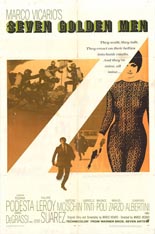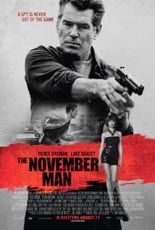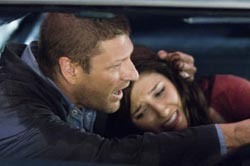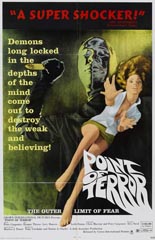
 Seven Golden Men is the rare heist film that opens with the heist. Heck, its entire first half is the heist. There’s no planning, no telegraphing of what the caper entails; we learn what happens as it happens, and our enjoyment is heightened all the more because of it.
Seven Golden Men is the rare heist film that opens with the heist. Heck, its entire first half is the heist. There’s no planning, no telegraphing of what the caper entails; we learn what happens as it happens, and our enjoyment is heightened all the more because of it.
Masterminded by the erudite Professor (Philippe Leroy, La Femme Nikita), said heist is of a Swiss bank containing the world’s only electronic-controlled vault with an electromagnetic locking device. It’s said to be physically impenetrable, but the Professor’s team of six men prove that wrong by tunneling their way in underground — kinda like in Roger Donaldson’s The Bank Job — right outside on the street, through the water mane and then straight up into the neatly stacked loot of 24-karat gold bars. Providing distraction on the street and elsewhere is the Professor’s gal pal (the stunning Rossana Podestà, 1983’s Hercules), making umpteen costume changes — including one memorable see-through bodysuit — during the whole charade.
 What the second half entails, I leave for you to discover. Suffice to say, it’s as frivolously paced as the first, full of comic flourishes, only-in-the-movies gadgetry and, like all Italian genre films of its era, themes that slide smoothly into the ear canal and stay there. Directed and co-written by The Sensual Man’s Marco Vicario, then married to Podestà, this Golden pic is as light as a serving of cotton candy tied to four dozen helium balloons — in other words, pure pop-cinema pleasure.
What the second half entails, I leave for you to discover. Suffice to say, it’s as frivolously paced as the first, full of comic flourishes, only-in-the-movies gadgetry and, like all Italian genre films of its era, themes that slide smoothly into the ear canal and stay there. Directed and co-written by The Sensual Man’s Marco Vicario, then married to Podestà, this Golden pic is as light as a serving of cotton candy tied to four dozen helium balloons — in other words, pure pop-cinema pleasure.
One year later, the Seven Golden Men struck again in Seven Golden Men Strike Again. —Rod Lott








